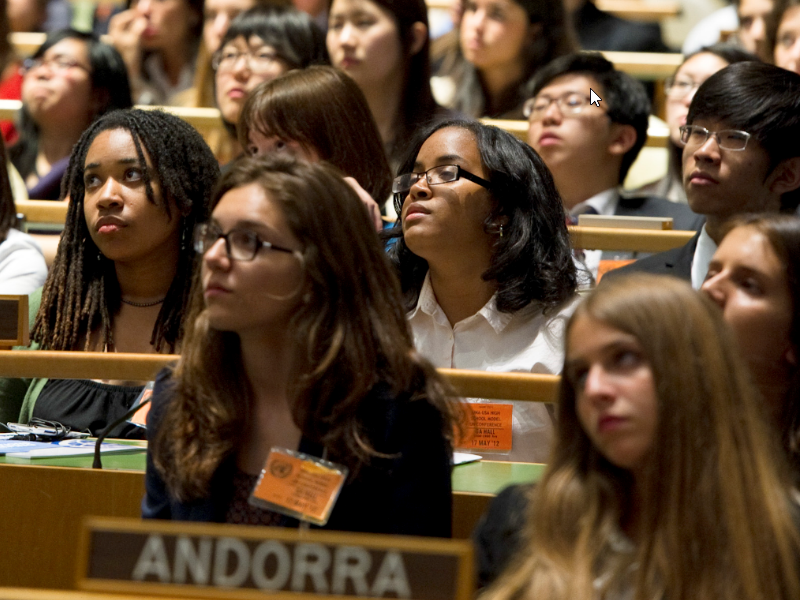Youth and the Doha Declaration Global Programme
 The world today is home to the largest generation of young people in history. Young people constitute an invaluable asset we need to invest in and empower so they can achieve their full potential.
The world today is home to the largest generation of young people in history. Young people constitute an invaluable asset we need to invest in and empower so they can achieve their full potential.
While youth are key agents of change, they also face many challenges that make them vulnerable to crime, drugs, violence and victimization. To counter this, the UN recognizes the importance of supporting and actively engaging youth to pave a safer, more peaceful world. The role of youth was emphasized in the Doha Declaration, adopted in 2015 after the 13th UN Congress on Crime Prevention and Criminal Justice. In particular, the Doha Declaration seeks to promote the rule of law with particular emphasis on children and youth, and stresses the fundamental role of youth participation in crime prevention efforts.
In 2016, UNODC launched the Global Programme for the Implementation of the Doha Declaration. Two of the Global Programme’s four components – Youth Crime Prevention through Sports and the Education for Justice (E4J) initiative – are dedicated to youth. These two components have impacted over 1.55 million youth worldwide and developed over 150 educational tools and resources aimed at young people, including university modules, training materials, a Resource Guide on Model United Nations conferences and a series of educational games.
STRENGTHENING YOUTH RESILIENCE TO CRIME AND VIOLENCE THROUGH SPORTS

The Youth Crime Prevention through Sports initiative builds on the power of sport as a tool to promote peace and strengthen the resilience of youth, especially those in vulnerable situations.
This component developed the Line Up Live Up initiative, a sport-based life skills training programme for young people aged 13-18. UNODC also actively engages other UN entities to strengthen the role of youth in making societies more resilient to crime and violence and related problems. This includes cooperation with UNDESA and with UNESCO on the use of sport for skills development and learning, youth empowerment and participation. UNODC has also joined forces with the civil society sector, sports organizations, and local government institutions to enhance the resilience of vulnerable and at-risk youth to become community leaders and SDG 16 advocates.
LineUpLiveUp: Preventing youth crime and violence through sport — the documentary
#LineUpLiveUp
Preventing youth crime and violence through sport — the documentary

Launch of a renovated sports centre in Kyrgyzstan
The component regularly undertakes the following activities:
- Sports-based life skills training activities for young people;
- Sports festivals and other awareness-raising events at national and local levels, organized in partnership with Member State partners, civil society organizations and sports federations;
- Refurbishment of sports centres, schools and other sports-related community structures to reach out to young people through sports and create safe spaces for meaningful engagement and positive interaction;
- Capacity-building of civil society organizations through the provision of grants to reach out to vulnerable young people using sports-based programmes and other community interventions to build resilience to violence and crime;
- Online sessions and activities to continue engaging young people in the era of COVID-19; and
- Development of technical tools and guidance on the effective use of sport for the prevention of youth crime and violence, including preventing violent extremism.
Sport Is My Life
Jujitsu the Fears Away • CHOOSE SPORT • S1E6
#ChooseSport
Jujitsu the Fears Away
Becoming Champions • CHOOSE SPORT • S1E4
#ChooseSport
Becoming Champions
EDUCATION FOR JUSTICE (E4J) INITIATIVE

The E4J initiative has been developed to create and disseminate educational materials on UNODC mandated areas of crime prevention and criminal justice across primary, secondary and tertiary education levels. Overall, E4J's objective is to empower youth to become socially responsible global citizens with a sound moral and ethical compass who are prepared to tackle the world’s challenges related to the rule of law.
E4J aims to build the capacity of educators to equip students with a better understanding of issues that can undermine the rule of law and the ability to addresses these. The initiative collaborates with stakeholders such as Governments, civil society organizations, youth associations, the private sector, and other international organizations to achieve its objectives through the creation and dissemination of age-appropriate educational activities and materials.
Education for Justice — the documentary
#Education4Justice
Education for Justice Initiative — the documentary

E4J High Level Conference held in Vienna

Tech-Tackle Girls Hackathon 4 Justice held in Nigeria
The initiative has also created an online Library of Resources: a comprehensive, open-access database of educational materials. The Library is continuously expanding and currently contains over 7,200 documents in several languages that assist educators’ lesson planning and teaching on a range of rule of law topics. Through this online resource and the wider range of tools and materials detailed below, the E4J website provides comprehensive and easily accessible educational content on rule of law-related topics.
The E4J initiative regularly engages in the following types of activities:
- Training of teachers and academics to educate children and youth on rule of law issues;
- Debates, conferences and mobilization events to stimulate young people’s involvement with rule of law issues and SDG 16;
- Conferences and development opportunities for young academics at the tertiary level, including first-hand experience in working with the United Nations;
- Contests and competitions to stimulate young people’s creative development of solutions for rule of law challenges; and
- Advocacy and engagement with policymakers on the empowerment of children and youth to promote the rule of law.









